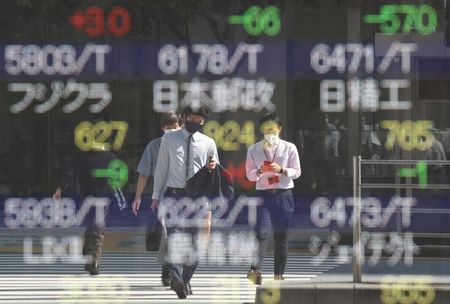 1
1 1
1

By Stella Qiu and Alun John
BEIJING/HONG KONG (Reuters) – Asian shares wobbled while commodity prices fell on Thursday, as mounting worries about the risks of a global recession amid aggressive rate hikes by the Federal Reserve kept broad investor sentiment fragile.
MSCI’s broadest index of Asia-Pacific shares outside Japan eked out a 0.5% gain in volatile trade, reversing earlier losses. Stocks in South Korea were down 0.7%, China’s blue chips rose 1.2%, and Japan’s Nikkei edged up 0.2%.
Chinese tech shares in Hong Kong staged a strong rebound, rising 2.8%, after Chinese President Xi Jinping chaired a top-level meeting on Wednesday that approved a plan for the further development of China’s large payment firms and the fintech sector.
Volatility is set to continue when European markets open. The pan-region Euro Stoxx 50 futures were down 0.4% while German DAX futures and FTSE futures saw similar declines.
Both Nasdaq futures and S&P500 futures eased 0.1%.
Overnight, the dollar fell alongside U.S. Treasury yields after Fed Chair Jerome Powell, in testimony to the U.S. Senate Banking Committee, underlined their commitment to bringing inflation down at all costs and acknowledged a recession was “certainly a possibility”.
A Reuters poll showed the Fed will deliver another 75-basis-point interest rate hike in July, followed by a half-percentage-point rise in September, and won’t scale back to quarter-percentage-point moves until November at the earliest.
“What is clear is the market views a recession as increasingly likely, a view heard from Powell, who detailed that a recession was a possibility but not their intention,” said Chris Weston, head of research at brokerage Pepperstone in Melbourne.
“Equities have held in well despite the falls in commodities, altogether there has been rotation into low-risk areas of the market and defensive sectors, with predictable outflows from energy and materials stock.”
U.S. stocks rallied after Powell’s remarks, which some analysts said did not break any new ground, before giving up gains. The Dow Jones Industrial Average fell 0.15%, the S&P 500 lost 0.13%, and the Nasdaq Composite dropped 0.15%.
Powell is set to give the second congressional semi-annual testimony later on Thursday. Investors are continuing to assess the risks of central banks pushing the world economy into recession as they attempt to curb inflation with interest rate increases.
Concerns about the demand outlook have sapped commodity prices, with oil on Thursday tumbling to the lowest in more than a month. Brent crude was down 2% to $109.60 per barrel and U.S. crude declined 2.2% to $103.89 a barrel.
Iron ore was already at six-month lows having lost more than 20% in recent weeks, while copper struck a 15-month trough overnight.
Moves in the Treasuries market on Thursday were rather muted, after a strong rally the previous day as investors sought the safety of sovereign debt amid growing fears of a recession.
The yield on benchmark 10-year Treasury notes were down slightly to 3.1524%, hovering around the lowest in almost two weeks, compared with its U.S. close of 3.156% the previous day.
The two-year yield, which rises with traders’ expectations of higher Fed fund rates, touched 3.0693%, compared with a U.S. close of 3.056%.
In foreign exchange markets, the dollar eased 0.1% against a basket of major currencies, bringing its decline since Friday to 0.46%. However, the index was up more than 8% this year, reflecting the broad risk-off sentiment and the dollar’s Fed-driven yield advantage.
Those factors were underscored by the South Korean won, which fell below a psychological threshold of 1,300 per dollar for the first time in 13 years, amid global economic recession worries.
The Australian and New Zealand dollars lost ground on Thursday as commodity prices fell.
Gold was slightly lower, with spot prices traded at $1,831.32 per ounce. [GOL/]
(Editing by Shri Navaratnam and Jacqueline Wong)